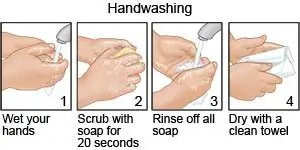What is cholera?
Cholera is an infection that can cause severe watery diarrhea and vomiting. These can start 12 hours to 5 days after you are infected with the bacteria that cause cholera. The diarrhea and vomiting cause severe dehydration that can lead to death within hours without treatment.
What increases my risk for severe illness?
- A heart or kidney disease that will be worse if you have dehydration
- Pregnancy
- Blood type O
- A condition that increases stomach acid
- Lack of immediate treatment
How are cholera bacteria spread?
The bacteria that cause cholera are not usually spread from person to person. A person is infected by coming into contact with an infected person's bowel movement. Infection can happen when a person eats or drinks food or water contaminated with an infected person's bowel movement. The bacteria can still stay in the digestive system for 10 days. This means the bacteria are put back into the environment each time an infected person has a bowel movement. The bacteria can then infect others, repeating the cycle.
How is cholera diagnosed?
Your healthcare provider will examine you and ask about your symptoms. Tell your provider if you recently traveled to a country where cholera is common or has a current outbreak. Tell your provider if you recently ate or drank anything that was contaminated or not cooked properly. A sample of your bowel movement will be tested for the bacteria that can cause cholera. This is the only way to be sure you have cholera.
How is cholera treated?
Treatment is important to help prevent others from becoming infected. You may need any of the following:
- Antibiotics may be given to kill the bacteria.
- An oral rehydration solution (ORS) can help prevent or treat dehydration. An ORS has the right amounts of water, salts, and sugar your body needs. Your healthcare provider can tell you where to get an ORS. Your provider can also tell you how much ORS to drink each day. You may need to drink several quarts for the first few days to prevent dehydration.
- Fluids may be given through an IV. This will help your body get the fluids as quickly as possible. This may be needed if you lose too much fluid too quickly. It may be needed if you are vomiting too much to keep any liquids down.
- Zinc may be given to children younger than 5 years. Zinc can help shorten the amount of time the diarrhea lasts. It can also help prevent watery diarrhea from other causes in the future.
- Breastfeed your child if he or she is infected and is still breastfeeding. Breast milk contains important nutrition for your child. It will also help prevent dehydration. Talk to your child's pediatrician if he or she is having trouble breastfeeding.
Treatment options
The following list of medications are in some way related to or used in the treatment of this condition.
- Cipro
- ciprofloxacin
- Vibramycin
- Doxy 100
- Doryx
View more treatment options
What can I do to prevent cholera?
The following steps are part of the Water, Sanitation, And Hygiene (WASH) program. WASH was created to help prevent the spread of cholera.
- Wash your hands often. Wash your hands after you use the bathroom, change a child's diaper, and before you prepare or eat food. Use soap and water. Rub your soapy hands together, lacing your fingers. Wash the front and back of your hands, and in between your fingers. Use the fingers of one hand to scrub under the fingernails of the other hand. Wash for at least 20 seconds. Rinse with warm, running water for several seconds. Then dry your hands with a clean towel or paper towel. Use hand sanitizer that contains alcohol if soap and water are not available. Do not touch your eyes, nose, or mouth without washing your hands first.

- Dispose of children's bowel movements safely. It is important for the bowel movement to be contained so it does not get back into the water supply. Talk to your child's healthcare provider about how to dispose of the bowel movements safely. You may need to follow local laws in your area.
- Drink and use only bottled, purified, or boiled liquids when you travel. Do not put ice in your drinks. Boil water for at least 4 minutes, or use purifying tablets to treat the water. Use bottled or treated water to brush your teeth or wash dishes.
- Do not eat raw food or dairy when you travel. Examples include fruits, raw vegetables in salads, oysters, clams, or undercooked meat. Do not have milk, ice cream, or other dairy products. Eat foods that are served hot or steaming, breads, peeled fruits and vegetables, and grilled foods.
- Prepare foods safely. Cook eggs until the yolks are firm. Use a meat thermometer to make sure meat is heated to 165°F (73.9°C) to kill any bacteria. Do not eat raw or undercooked poultry, seafood, or meat. Use only bottled, purified, or boiled water to prepare foods or clean in the kitchen. Rinse fruits and vegetables in running water. Clean cutting boards, knives, countertops, and other areas where you prepare food before and after you cook. Wash sponges and dishtowels weekly in hot water.
- Ask about the cholera vaccine. The need for the vaccine depends on the country you live in and your travel habits. The vaccine is not given routinely. It is only given to people who are at high risk for infection. Your provider can tell you if you need the vaccine and when to get it.
Call your local emergency number (911 in the US) or have someone call if:
- You have a seizure.
- You are confused or cannot think clearly.
- You are extremely sleepy, or another person cannot wake you.
When should I seek immediate care?
- Your heart is beating faster than usual.
- Your skin does not return to a normal position if you pinch it (stays pinched).
- You have a dry mouth, throat, eyes, or nose.
- Your eyes look deeply sunken, or you have no tears when you cry.
- You have muscle cramps or are too weak to stand up.
- You are dizzy, lightheaded, or feel like you are going to faint.
- You are dizzy or lightheaded.
- You urinate less than usual, or your urine is dark yellow.
- You have severe abdominal pain.
- Your hands or feet are cold, or your face is pale.
When should I call my doctor?
- You are not able to drink any liquids.
- You have questions or concerns about your condition or care.
Care Agreement
You have the right to help plan your care. Learn about your health condition and how it may be treated. Discuss treatment options with your healthcare providers to decide what care you want to receive. You always have the right to refuse treatment. The above information is an educational aid only. It is not intended as medical advice for individual conditions or treatments. Talk to your doctor, nurse or pharmacist before following any medical regimen to see if it is safe and effective for you.© Copyright Merative 2023 Information is for End User's use only and may not be sold, redistributed or otherwise used for commercial purposes.




